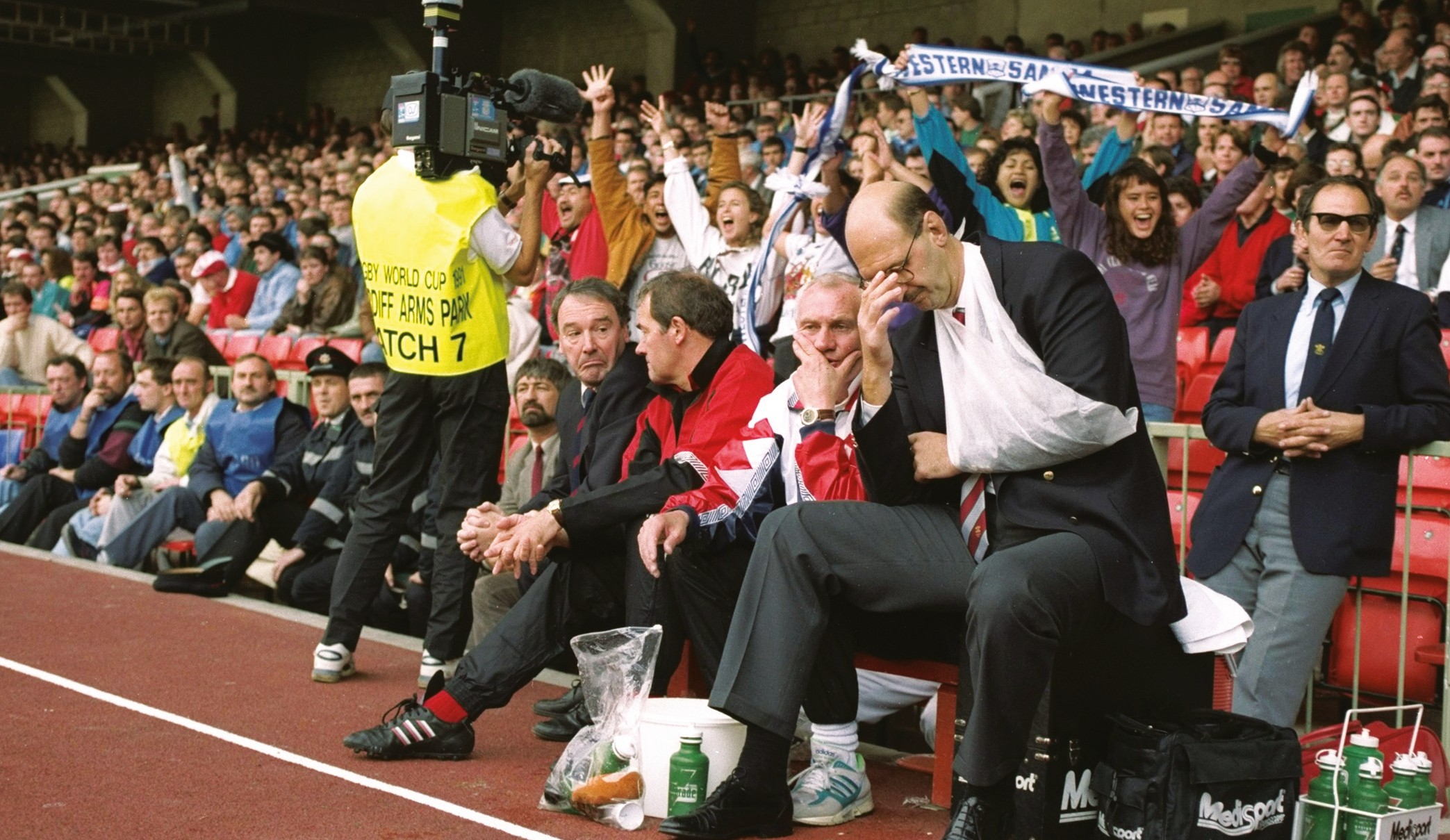World Cup horror show too gruesome to witness

Brendan Gallagher delves into some of rugby’s most enduring images, their story and why they are still so impactful
Iconic Rugby Pictures: PART 32
Western Samoa send shockwaves through Cardiff October 6, 1991
What’s happening here?
It’s Saturday, October 6, 1991 at the old Cardiff Arms Park and Wales, joint hosts of the World Cup, are playing the exuberant Western Samoans – the nation not being retitled as Samoa until 1997 – in their Pool. Veteran Wales lock and Llanelli skipper Phil May has been helped off the pitch in the first half after being the wrong end of a huge Samoa tackle and is now watching the final throes of the game in despair from the bench. Or rather he can’t watch it, Wales are on the cusp of losing 16-13 and it’s too much to bear.
What’s the story behind the picture?
Among other things the great irony of this picture and the calamitous day at the office it portrays is that Wales were one of the few big rugby nations to properly recognise and respect Western Samoa.
While the rest of the Five Nations baulked at touring the ‘minor’ nations which we now stigmatise with the Tier 2 label, Wales, to their great credit, headed off to the South Pacific in 1986 for a trailblazing tour in which they played Samoa in Western Samoa, Fiji in Suva and Tonga in Nuku A’lofa.
Wales were unbeaten on that demanding tour with their best performance being a 32-14 win over the Samoans in 100 degrees-plus heat when, among other things, the chronically underrated Pontypool flanker and speed merchant Mark Brown outplayed a young Michael Jones making his one appearance for Samoa. Brown was ignored thereafter. Then in 1988 Wales did the decent thing and hosted Samoa at the Arms Park, beating them 28-6. Wales knew all about Samoa and their eclectic bunch of largely New Zealand-raised or based players. They were fully aware of the talent of Brian Lima, To’o Vagea, Frank Bunce, Stephen Bachop, Pat Lam, Apollo Perellini, Peter Fatialofa, Matt Keenan et al. This was Western Samoa’s World Cup debut but those who labelled them no hopers simply hadn’t been paying attention. In the lead up to the tournament that summer they had thrashed Tonga 41-13 and Fiji 40-23 and they had been unbeaten in 1990 also. They were always going to be very dangerous floaters and Wales knew it.
What happened next?
Wales lost an explosive, contentious game 16-13. Many of the Samoan hits were ferocious and, by the standards of today, illegal but rugby was different 30 years ago, check out some of the rucking and rough house treatment in the France v England quarter-final for confirmation!
It was, in fact, a pretty even contest and the result hinged on one incident in the first half in which the classy Samoan centre To’o Vagea was adjudged to have won the chase with Robert Jones to a chip ahead to score a vital try. There were no video replays as such back then but the slow motion footage from the one TV camera to capture the incident suggested that French referee Patrick Robin had got it wrong.
“I was three yards away and I clearly saw Robert put his hand on the ball first,” said the Wales captain, Ieuan Evans. “The referee was way back on the 22.”
Why is it iconic?
If ever a picture summed up a mood of utter despair and imminent defeat this is it. Earlier in the day, May, the veteran Llanelli captain, had been a combatant but had come off second best to a pile-driving tackle by Perelini and was reduced to rubble with a dislocated shoulder. The fact that there was time to shower, dress and get strapped up by the medics before returning to witness the last rights seems only to add to the poignancy. Perelini, named after Apollo 11 which landed on the moon the day after his birth in 1969, also sent Richie Collins into orbit with another monster hit and slowed Tony Clement down with a pile driver. He later wreaked havoc with St Helens RL. There is a sense of nadir and bottoming out in this picture.
Throughout the 1980s Wales struggled manfully to live up to the glitter and success of the 70s. There had been very decent moments – third place at the 1987 World Cup, a Five Nations Championship in 1988 – but gradually a very real and worrying decline had begun to set in.
In 1990 they were whitewashed in the Five Nations with a 34-6 thumping at Twickenham being particularly hard to bear and 12 months later they surrendered their 28-year old unbeaten record against England in Cardiff. And now this. Former fly-half Gareth Davies, a pundit for the day on BBC, summed it up nicely: “Thank God we didn’t play the whole of Samoa.” Footnote: It was a famous win but in many ways Western Samoa’s finest moment, albeit in defeat, came less than three days later when the same XV had to ‘go again’ in the clawing mud and driving rain of Pontypool Park against an Australia side that had enjoyed two days’ more rest after their opening day win against Argentina. It was a ridiculous schedule but in alien conditions Samoa went to the well one more time and contrived to give the eventual world champions the fright of their lives before finally succumbing 9-3.
“May had been reduced to rubble with a dislocated shoulder by a pile-driving tackle by Apollo Perelini”